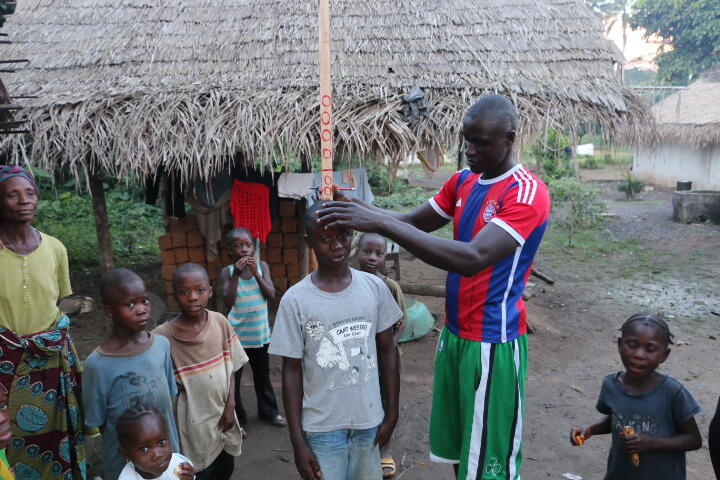
The COUNTDOWN programme for Neglected Tropical Diseases (NTDs) is to be launched in Liberia on Wednesday, 19th October 2016. Liberia is recovering strongly from the huge loss it suffered as a result of the Ebola outbreak in 2014, and like a phoenix rising from the ashes, there is a new initiative to improve the wellbeing of the people and diminish the burden of NTDs.
NTDs affect mostly the poor of society and the disease burden remains underestimated due to their ‘neglected’ nature. Most of these diseases take many years to show symptoms and therefore often go undiagnosed or misdiagnosed until it is too late to reverse the damage. Around the world, one billion people are infected or at risk of infection with an NTD and 500 million of these people are in Africa, living mostly in rural areas.
COUNTDOWN is a five-year research programme funded by the UK’s Department for International Development (DFID). This research focuses on the control and elimination of key NTDs in Liberia and is firmly set within a health systems perspective. COUNTDOWN’s work seeks to understand better implementation strategies for current NTD programmes as well as reflecting on how the programme can be better owned by communities and integrated within the health system at district, county and national levels. As the health workforce is critical in NTD programme delivery, COUNTDOWN has therefore identified the need to appreciate and respect the experiences and training needs of health workers to ensure that the programme remains sustainable throughout this research and beyond.
Karsor Kollie, the COUNTDOWN Liberia Country Manager said: “Liberia is no exception to the millions of people affected or at risk of NTDs. This is why the Liberia NTDs Program is committed to ending the neglect by meeting national targets of control and elimination of NTDs. This we intend to achieve through implementations of newly generated information and findings from the implementation research. We will continue to rely on partnership, visibility of the programme and resources mobilization; to ensure health system and community resilience and ownership in the fight against tropical diseases affecting the poor. We are open to change in approaches where necessary, that will strengthen the already existing strategies of Preventive Chemotherapy and Case Management of patents.”
According to the World Health Organisation (WHO), there is overwhelming evidence to show that the burden caused by NTDs can be controlled and in many cases may be close to elimination. To this end, WHO in 2011, created a roadmap to provide impetus for ongoing implementation activities.
This roadmap set the target period from 2012 to 2020 and introduced two strategic interventions to deal with NTDs. These interventions are Preventive Chemotherapy – which administers regularly quality drugs on a large scale for the treatment of these diseases, and intensified disease management of other diseases for which simple tools and treatments are not yet available.
The Mano River Union (MRU) meeting taking place from 19 – 21st October, 2016 and hosted by Liberia is focusing on NTDs for this year’s session. This is especially significant given the plans to re-instate Mass Drug Administrations (MDAs). MDAs for these diseases have been ongoing in Liberia for many years but was interrupted during the Ebola outbreak. This presented a setback on reaching the targets for control and elimination of NTDs in Liberia.
Out of the 19 NTDs identified by WHO, four are prevalent in Liberia. These include River blindness – otherwise known as onchocerciasis caused by the Onchocerca parasite and transmitted by blackflies; Bilharzia or snail fevers, also known as Schistosomiasis – which is caused by the Schistosoma parasite transmitted by fresh water snails; Elephantiasis or lymphatic filariasis caused by the Wuchereria parasite, often transmitted by mosquitoes and Soil-transmitted helminthiasis caused by nematode worms, often intestinal, is generally transmitted as a result of poor sanitation and walking barefooted.
To strengthen its efforts to fight these prevalent NTDs, Liberia’s Ministry of Health and University of Liberia – Pacific Institute for Research and Evidence (UL-PIRE) serve as critical partners within the COUNTDOWN consortium, which is linked to the Liverpool School of Tropical Medicine to undertake this implementation research.
“Our implementation research is already helping optimise NTD control programmes in Ghana and Cameroon. In Liberia, we look forward to developing appropriate strategies that address current health inequities to promote well-being as quickly as possible. Our future work in Liberia will better assess how to strengthen and support current interventions in light of the post-Ebola endemic. More broadly, building technical expertise across the country will foster resilience within health system and help Liberia move forward with cost-effective control and elimination of our key NTDs.” said Prof. Russ Stothard, the Director of the COUNTDOWN programme.
The Manor River Union which is made up of Ivory Coast, Guinea – Conakry, Sierra Leone and Liberia; was created with the joint goal of fostering socio-economic development and is now extending this collaboration to health.